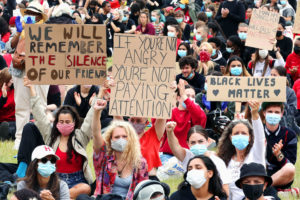Why are some groups of people in a weaker position than others? Because, today’s progressives argue, a stronger group put them there, and is acting to keep them there, consciously or subconsciously. According to this narrative, the responsibility for eliminating — or at least reducing — disparities lies with the better-off group, since the worse-off one has been robbed of agency. It’s a straightforward story of villain and victim. And it’s far from the whole truth.
In the US, a small group of African American thinkers is pushing back against progressive orthodoxy on the race issue. Glenn Loury — a Professor of Economics at Brown University — has long argued that while historical discrimination against African Americans is undeniable, it is not the sole explanation for racial disparities in income or education. And Thomas Sowell, the conservative African American Stanford University economist, has taken on what he sees as progressives’ faulty answers in a new book, Social Justice Fallacies.
“At the heart of the social justice vision”, Sowell writes, “is the assumption that, because economic and other disparities among human beings greatly exceed any differences in their innate capacities”, they must be the result of “such human vices as exploitation and discrimination”. In his 2019 book, How to be an Antiracist, Ibram X. Kendi stated this case plainly: “Antiracist ideas argue that racist policies are the cause of racial inequities.” Here in Britain, leading progressive think-tanks such as the Runnymede Trust also often link racial disparities — in spheres such as health, housing, education and employment — to “systemic racism”.
Debates over the causes of group disparities are fierce precisely because they shape the answers to the practical questions of what is to be done and who is responsible for doing it. If racial disparities are caused by racism, the responsibility for redressing them lies with those perpetuating it, hence today’s progressive focus on the ideology of white supremacy.
But Sowell has other ideas about why some groups are doing much better. While he acknowledges that exploitation and discrimination do “prevent different groups of people — whether classes, races or nations — from having equal, or even comparable, outcomes in economic terms”, he maintains that this is only part of the story. Some groups, he suggests, may be better off because they have, over a period of time, collectively mastered endeavours that have turned out to be profitable, teachable to younger generations and conducive to group progress. He cites people of German ancestry having created leading beer brands in countries as varied as the US, Argentina, Brazil, Australia and China — not by coincidence, but because the ancestors of today’s Germans were producing beer as far back as the days of the Roman Empire. “When a particular people have been doing a particular thing for more than a thousand years,” he writes, “is it surprising if they tend to be more successful in that particular endeavour than others who have had no such history?”
All groups excel at something. Those statistically worse off educationally, for whatever reason, may be underrepresented in jobs where a degree is essential but over-perform in endeavours where personal talent determines success. Sowell cites sports and entertainment as spheres in which “American groups rising out of poverty” have excelled. But most people would find it odd if someone argued that the fact that 72% of NBA players are black implies that other groups are being discriminated against in US basketball. Likewise, the fact that the median per capita income of Americans of Chinese, Japanese, Indian and Korean ancestry is higher than that of white Americans is not interpreted as a sign that the US system is designed to advantage those minorities.
To “honestly admit the reality of vast differences in specific capabilities of different peoples, at different times and in different places, is no capitulation to genetic determinism”, Sowell insists. It is an assertion that will likely make more than a few people uneasy, depending on the groups being compared (although I would argue that we should always be wary of making generalisations about groups). Because China is now one of the world’s two economic superpowers, few object to comments about how the Chinese may do such-and-such better than the Americans, but the Americans are better at such-and-such than the Chinese. But most of us feel uncomfortable if similar comparisons are made between, say, Africans and Europeans. Disparities between these two groups are so wide that there exist strong fears that drawing parallels could be interpreted as arguing that the richer group is simply superior to the poorer. Which was, of course, the explicit justification for enslaving and colonising Africans — something people haven’t forgotten.
Partly because of this, if certain behavioural patterns among some groups of African ancestry — here in the West or in Africa — are pointed to as detrimental to wider black progress, Western progressives will often describe this as ‘victim-blaming’. If an African country is corruptly and ineffectively governed, the argument goes, it is because its leaders inherited exploitative colonial structures. The question of why such structures have not been dismantled or at least significantly reformed in the decades since independence will usually be answered with reference to structural constraints, imposed by the West. Africa’s ruling elites are ultimately victims — in the Western progressive worldview, anyway. No African progressive living in Africa thinks this way.
The phrase ‘victim-blaming’ was coined by psychologist William Ryan in his 1971 book, Blaming the Victim — which was a response to discussions about the role of African American family structures, which were described as perpetuating black poverty in the infamous Moynihan Report of 1965. But I believe the concept of ‘victim-blaming’ gained the power it wields today mostly thanks to feminist activists, who used it to describe how female rape victims may be questioned about what clothes they were wearing when attacked or how late they had been out. Their rhetoric was then adopted by anti-colonialists. Explaining his reasons for rejecting an MBE in 2019, British spoken word artist, George the Poet, who is of Ugandan descent, said: “Your forefathers grabbed my motherland, pinned her down and took turns. They did that every day for a couple hundred years and then left her to treat her own burns.” In many a Western progressive mind, the West violates other nations via neoliberal economic exploitation, then has the gall to tell those it has exploited that their poverty is their fault — because they didn’t work hard enough, were not well-organised enough, or allowed corruption to flourish. All in order to convince the world that the system they have built is a just one, when it obviously isn’t.
But dismissing, as ‘victim-blaming’, any arguments citing a weaker group’s actions as obstacles to that group’s progress is not helpful to anyone, least of all the weaker groups themselves. It is especially unfortunate when people do this not because they genuinely believe the argument is baseless, but because they want to signal empathy by demonstrating that they always side with the underdog — which is the sine qua non to being accepted by the progressive elite. This self-serving approach is deeply hypocritical, given that progressivism’s stated aim is to uplift groups in a weaker position, and to do that we need to have frank conversations about what may be going wrong within a group. Scholars such as Sowell and Loury, for instance, argue that the questions raised in the Moynihan Report remain valid points of discussion.
In my recent book, It’s Not About Whiteness, It’s about Wealth, I argue that the future status of blackness depends not on what happens in Britain and America — where just 3% of the world’s black population live — but on what happens in Africa, where 90% of black people live. If we are ever to speak of any kind of meaningful global racial equality, Africa must succeed. If it is to succeed, we must talk about its failures.
Does anyone genuinely believe that the mind-boggling corruption of Africa’s ruling elites is not a major factor contributing to the continent being the poorest and least economically developed? To there being close to 500 million Africans — more than the EU’s population — living on less than $2 a day? To there being 600 million people lacking access to electricity in the year 2023? Can anyone maintain that all this poverty can be blamed on legacies of colonialism and slavery?
Even if we can blame all Africa’s problems on the past, shouldn’t the focus be on what can be done to change things today? Merely identifying the root cause of a problem does not give you a solution to the problem. That is another task entirely. Without radically improving the way most African countries are run, prosperity will continue to elude the continent. Africa has been dealt a terrible hand by history, but none of us can change the past. All we can do is play the cards we have today as best we can, so that our hand may be stronger in the future.
Of course, today’s Western progressives often appear to believe that only Westerners have the power to change anything fundamental about society, including in countries thousands of kilometres away. It is the modern-day manifestation of Eurocentrism: the idea that the world revolves around what white Westerners think and do. Development outcomes elsewhere are thus always traceable to some Western action, past or present.
In his book, Sowell emphasises that the onus of changing the fortunes of worse-off groups rests primarily on them. But the debate over the factors driving group disparities — between those who emphasise individual agency and those who emphasise external factors — does not have to be a zero-sum game in which one side must ultimately triumph. Both can play their part in taking practical steps to improve things for the worse-off in this world — which would involve looking at big-picture structural changes as well as honest analysis of potentially damaging group dynamics. Ideologies like products are subject to the laws of demand and supply, and there is clearly a strong demand for the social justice vision today — signalling a genuine mass craving for a fairer world in which there is less poverty, inequality and needless human suffering. We’d surely rather this craving existed than not. The key is to apply it usefully: to always be open to evidence about what is working and what isn’t, about who needs to do what, when and how.
Disclaimer
Some of the posts we share are controversial and we do not necessarily agree with them in the whole extend. Sometimes we agree with the content or part of it but we do not agree with the narration or language. Nevertheless we find them somehow interesting, valuable and/or informative or we share them, because we strongly believe in freedom of speech, free press and journalism. We strongly encourage you to have a critical approach to all the content, do your own research and analysis to build your own opinion.
We would be glad to have your feedback.
Source: UnHerd Read the original article here: https://unherd.com/



